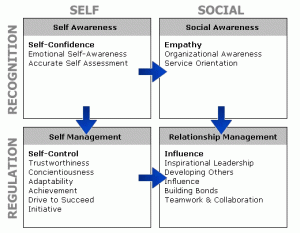Nowadays, emotional intelligence in the workplace is a topic at the forefront of effective management and leadership. It is at the heart of how some managers are able to get productivity, loyalty and initiative out of people, while others struggle, even when they seem just as smart.
We usually say he or she has better “people skills”. And that’s about right. Most people in business would agree that to get results through or from other people, is key to one’s success – unless you are a dedicated ‘soloist’.
You’ve seen or perhaps experienced the nightmare boss – the guy who is fussy, short tempered and demanding. Clearly, hard to work for. Why? Because he unbalances people emotionally, and does not care about how he makes them feel. Their emotional reaction drastically affects how they respond and what they will or will not do in return.

So how much more effective would that boss be if he were patient, calm and understanding, in his approach?
We’ve all had the experience of ‘losing it’ out of frustration or stress and saying things in the moment that we regret later. Things, that upon reflection, have further slowed or exacerbated the situation – hardly what we wanted in the first place.
One’s ability to perform work or function properly in a job can be broken into three areas:
- Technical competency and skills
- Intellectual capability – our cognitive ability commonly known as IQ (Intelligence Quotient)
- Emotional capability – often referred to as Emotional Intelligence or Emotional Quotient
Emotional Intelligence is a measure of one’s ability to recognise, understand and manage emotions in ourselves and others. Getting results and performance from your team, demands that you master some basic skills in this area.
The concept of Emotional Intelligence became widely known through Daniel Goleman’s book of the same name back in the 1990’s. It’s a “must read” for anyone who works with people on any level (as are several of Goleman’s other books). Goleman argues that EI is a far, far greater predictor and ingredient of business success than cognitive intelligence.
Goleman developed the Emotional Intelligence Competencies Model which breaks this concept down into something that is easily understood. Whilst the concept is universally applicable, Emotional Intelligence in the workplace has a significant impact on productivity, morale and ultimately bottom line profits.

Daniel Goleman’s Emotional Intelligence Competencies Model
- It all starts with Self Awareness. One has to be able to recognize one’s emotions and the effects your emotions have on others. You also need to have the correct measure of self-confidence.
- This leads to two things:
- the ability to exert self-control and manage the characteristics that will lead greater achievement: Drive, conscientiousness, adaptability etc.
- the ability to empathise and be aware of the people around you and your role within the organization and the community.
- With self-management and social awareness, one can successfully operate relationships where you can exert your influence, and drive results through others.
In business there is a range of relationships you need to be effective in:
- Your employees
- Your peers
- Your manager
- Your customers
- Your suppliers
- Your strategic partners
And don’t forget your social relationships, family and friends.
So what are the ingredients for being emotionally intelligent in a business setting?
- Be direct and to the point. Be clear about the facts and tell it like it is. Don’t use sarcasm or emotive words for effect and never be personal.
- Say what you mean and mean what you say. Be the model of consistency so that people learn to trust you. People will find it difficult to play games with you and the outcomes will be greater.
- Be transparent. Tell people what they need know. Share. If you treat people like adults, they will respond positively. Don’t be paternalistic or patronising.
- Be positive. Your team is scrutinizing you every moment of every day. They take their lead from you. You need to show confidence and control.
- Be caring. Don’t forget how important your team is in helping you to achieve your goals. Get to know the people that work for you. To make your business more important to them, you need to show interest in what’s important in their lives.

Exercising Emotional Intelligence in the workplace will yield dividends. Your team will enjoy their work more and they will naturally do more. Your business will gain a reputation as a great place to work and recruitment will become easier.
Not only should you take this on, but why not educate your team in Emotional Intelligence too?
Related articles:
Authentic Leadership: A Practical Perspective
Getting better results from your team; a quick primer

